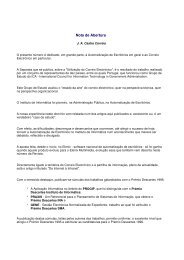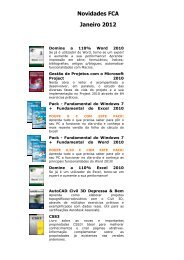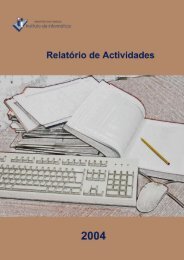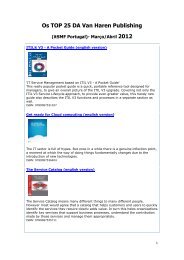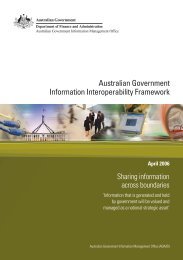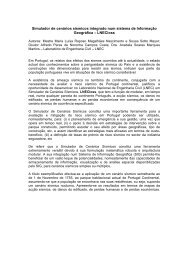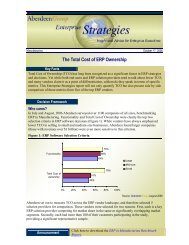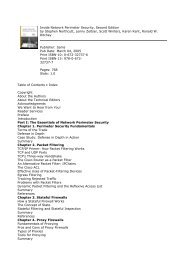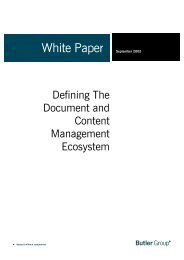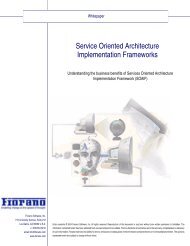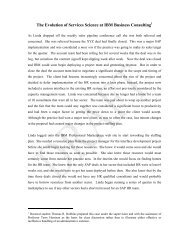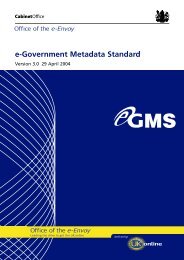OECD Peer Review of E-Government in Denmark - ePractice.eu
OECD Peer Review of E-Government in Denmark - ePractice.eu
OECD Peer Review of E-Government in Denmark - ePractice.eu
You also want an ePaper? Increase the reach of your titles
YUMPU automatically turns print PDFs into web optimized ePapers that Google loves.
The CRS encompasses a number <strong>of</strong> registers:<br />
• The Civil Register: this conta<strong>in</strong>s current <strong>in</strong>formation about each citizen <strong>in</strong>clud<strong>in</strong>g personal<br />
identity number, address, name, civil status and citizenship.<br />
• The Road System Register: this conta<strong>in</strong>s current <strong>in</strong>formation on all Danish roads. Each road<br />
is assigned a road code and a name, and the register also conta<strong>in</strong>s <strong>in</strong>formation about its<br />
adm<strong>in</strong>istrative relationship (parishes, postal districts and vot<strong>in</strong>g districts).<br />
• The Hous<strong>in</strong>g Register: this conta<strong>in</strong>s the addresses <strong>of</strong> all Danish dwell<strong>in</strong>gs and is used where<br />
it is necessary or practical to access the CRS us<strong>in</strong>g an address rather than a name, and to<br />
determ<strong>in</strong>e whether people are mov<strong>in</strong>g to an “approved” dwell<strong>in</strong>g (<strong>in</strong> terms <strong>of</strong> various<br />
government policies and services).<br />
• The Register <strong>of</strong> Authorities: this is the <strong>in</strong>dex <strong>of</strong> all public authorities that deal with the CRS.<br />
The register lists each authority’s address, telephone number and facsimile number, along<br />
with adm<strong>in</strong>istrative <strong>in</strong>formation such as authorities’ place <strong>in</strong> the public sector <strong>in</strong> relation to<br />
courts, counties and police districts.<br />
Individuals’ CRS file conta<strong>in</strong>s their identification number, name, address, marital status, place <strong>of</strong><br />
birth, citizenship, k<strong>in</strong>ship, declaration <strong>of</strong> any <strong>in</strong>capacity, pr<strong>of</strong>ession, membership <strong>of</strong> the Lutheran<br />
Church <strong>of</strong> <strong>Denmark</strong>, vot<strong>in</strong>g rights, municipal circumstances, registration notes and, eventually, death.<br />
When name, address, civil status and citizenship are updated the old data rema<strong>in</strong>s <strong>in</strong> the CRS as<br />
historical data. Each identity number is unique, and thus functions as <strong>in</strong>dividual identification. The<br />
entire public sector uses the identification number for adm<strong>in</strong>istrative purposes. It is also used for a<br />
variety <strong>of</strong> reasons by the private sector under tightly proscribed arrangements. Citizens can request<br />
that their <strong>in</strong>formation be confidential, and available only to public <strong>in</strong>stitutions and creditors.<br />
Two pieces <strong>of</strong> legislation regulate the operation <strong>of</strong> the CRS: The Act on Process<strong>in</strong>g <strong>of</strong> Personal<br />
Data 2000 and the Danish Act on the Civil Registration System 2000. The latter law enhanced private<br />
sector access to the CRS, allow<strong>in</strong>g private actors to obta<strong>in</strong> <strong>in</strong>formation on <strong>in</strong>dividuals that has been<br />
made public under data process<strong>in</strong>g legislation without advance permission from the Danish Data<br />
Protection Agency.<br />
In <strong>in</strong>terviews, <strong>of</strong>ficials <strong>of</strong>ten mentioned the CRS as a core piece <strong>of</strong> the e-government environment<br />
that provides a significant advantage <strong>in</strong> development <strong>of</strong> more user-focused services. Aside from its<br />
functionality, the long-stand<strong>in</strong>g existence <strong>of</strong> the CRS has brought two major benefits. First, it has to<br />
some degree preconditioned public servants for the <strong>in</strong>troduction <strong>of</strong> e-government by gett<strong>in</strong>g them used<br />
to rely<strong>in</strong>g on common stores <strong>of</strong> data that have been developed on the basis <strong>of</strong> a “collect once, use<br />
many times” pr<strong>in</strong>ciple. Second, it has enabled Danes to develop high levels <strong>of</strong> experience and trust <strong>in</strong><br />
government’s ability to collect, store and use their personal <strong>in</strong>formation without compromis<strong>in</strong>g their<br />
privacy, and readied them for the wider <strong>in</strong>troduction <strong>of</strong> adm<strong>in</strong>istrative data shar<strong>in</strong>g <strong>in</strong> support <strong>of</strong><br />
e-government.<br />
Public Key Infrastructure<br />
Some <strong>OECD</strong> countries have chosen to rely upon a public key <strong>in</strong>frastructure (PKI) as the means<br />
by which they will: 1) secure the transmission <strong>of</strong> electronic <strong>in</strong>formation between citizens, bus<strong>in</strong>esses<br />
and government organisations; and 2) verify the identity <strong>of</strong> people (i.e. authenticate) who are<br />
provid<strong>in</strong>g and/or us<strong>in</strong>g electronic government <strong>in</strong>formation or services. Public key technology is<br />
currently the strongest form <strong>of</strong> <strong>in</strong>formation security technology be<strong>in</strong>g put <strong>in</strong>to general service <strong>in</strong> either<br />
94



